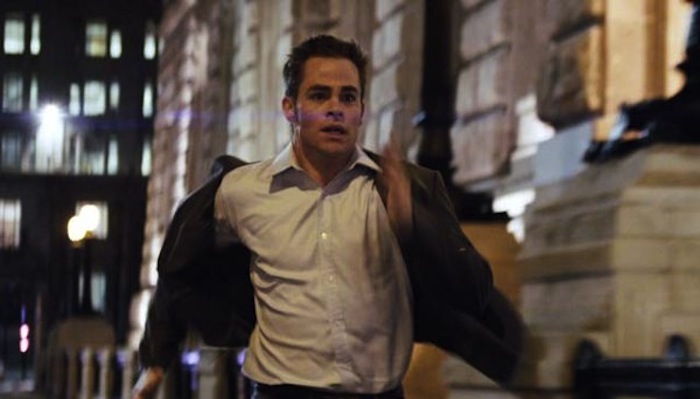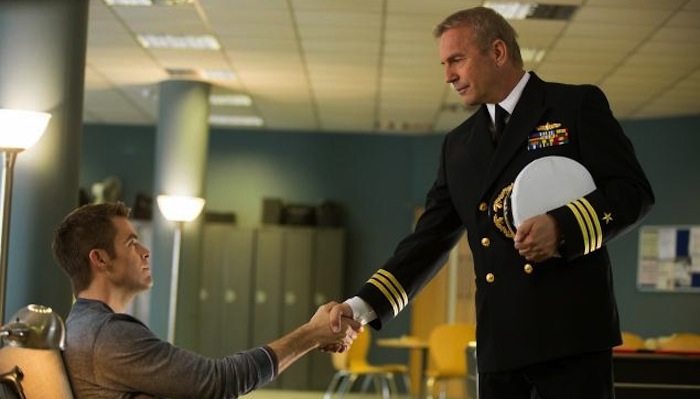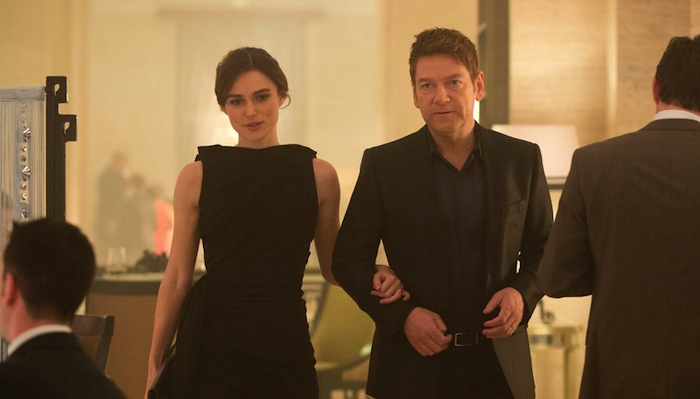There are many fans out there who adore Tom Clancy’s novels, especially his beloved fictional hero Jack Ryan. The character has been brought to life on the big screen a number of times by different actors, and that’s the case again with “Jack Ryan: Shadow Recruit.” Chris Pine plays the 4th incarnation of the Tom Clancy character in the upcoming spy thriller with Kenneth Branagh in front of, and behind, the camera.
We got the chance to speak with the cast and actor/director Kenneth Branagh about putting together this action-packed film.
What was your first Jack Ryan experience? Did you see a film or read a book?
Chris Pine: I’ve always loved the series. I’ve always loved the spy genre fiction and films, so I was well versed with the Clancy universe having watched the films growing up. Looking at the character and re-watching the films, I think what I most enjoyed for me was the difference that I saw in how Alec [Baldwin] portrayed the character and how Harrison [Ford] portrayed the character. With Alec in “The Hunt for Red October,” you have what Alec does really well which is this confident, intelligent, analytical man that knows what he knows and is not afraid to say it. With Harrison, with his tweed coat and his Volkswagon Jetta, he’s the humble intellect and he’s what Harrison does best which is the classic reluctant hero. I thought somewhere in that was a great way to begin looking at the character.
Was it more intimidating to step into Jack Ryan than to do Star Trek? Kevin Costner, you’ve been in russian spy thrillers before, how have things changed from the 20th century to the 21st century with this film?
Chris Pine: The great thing about the Jack Ryan films is that the plot and the story always takes center stage. I think if you’ve done your job as the actor portraying Jack Ryan, you are present enough to make an impact but you have the story shine. We had a great story that David Koepp came up with.
Kevin Costner: I don’t know what’s changed really. Hopefully when our movies are dealer they get realer when they happen to be the James Bond situation where a guy parachutes in, that kind of thing that’s another kind of spy movie. Our job was to entertain and to find the rhythms that do that, the language of the day and hopefully we don’t try to reinvent the wheel because spies are trying not to get caught, trying to stop bad things and hopefully the level of sophistication is always going up.
This character is part of a very different era. I’m wondering what were the pleasures and challenges of bringing Jack Ryan into this age. And also what aspects of the character that bringing this character in this day and age a pleasure and worth viewing.
Kenneth Branagh: I loved the previous pictures and the books. I like the Cold War era and the big sort of elemental standoff between the US and Russia, the east and west, the old empires and new empires. One of the exciting things about trying to re-imagine it was finding a world, so the interconnectivity of the financial markets was one that was both interesting and a bit of a brain-teaser for me. Chris is good at understanding it, thank God. To be able to put Jack Ryan there at a time when it was a different kind of elemental face-off between Russia and America, where one tiny event in one part of the world can serve traumatic catastrophic influence a larger event elsewhere. The same for me, that sort of good, principled, moral-conscious man in a very much dirtier world. For me that was pretty interesting, and although Chris is right to say that the story and the plot in these pictures is very important. For me it was a huge huge pleasure to work with these two great actors, to be able to follow what also I think is watching them think and feel with it in a layered way. The human dimension of the story, as portrayed by these fellas, was a huge pleasure for me in trying to make the movie.
You were going to be Jack Ryan at one point in time but now you’re playing the mentor role to Jack Ryan in this one. Can you talk a little bit about that, and for Mr. Brannagh can you talk about speaking Russian in this movie.
Kevin Costner: The mentor role is always, what can you offer a younger man? What can you offer a younger woman? The thing is the experience, and that by definition is the mentor experience, if you have a level of experience. That’s what I was… if you read it on paper, that’s the role that’s meant for me. It was inhabited perfectly with Chris in his role. What I liked about it was that I wasn’t just a person behind a desk going “Get the hell out of there! What the hell are you doing? You need to do it faster.” Kenneth was able to say wait a second, I want to incorporate some of your skill set into where, even though I’m a supervisor, that I could take the gloves off and become involved and bring a physical presence and team up with him at the right moment. I thought that was unusual for the mentor. Usually they’re back in Washington or they’re in a giant control room. In this instance we were always fairly close together, trying to sort it out a little bit together. As the movie progresses you see he possesses a lot of intuitive skills, whether it’s being how to survive or process a lot of information in a very quick way, in which I tell him a couple of times to slow down, remembering that I’m in another century.
What was your chemistry like with Keira Knightley, even when the cameras weren’t rolling?
Chris Pine: I don’t know if I’ve ever had more fun with an actress. She could not have been any more professional. She’s younger than I am and she’s done probably three times more films than I have. She’d show up, super smart, friendly, charming, in it, in the moment, and then she’d wrap. There was zero drama with Keira Knightley. It was the most lovely, wonderful experience you could ask for. And she was just present. It was her job. She took her job really seriously. She would ask the right questions. I think what I respond to more often than anything is just intelligence, and she was just sharp as a tack. The scene that I remember most was the scene that we have with Kevin here when she gets on board with our plan to take down Viktor Cherevin. It was just a great joy to work with someone like Kevin who’s been doing it for so long and with Keira who’s been doing it much longer than I have. I just felt like I was an apprentice.
Mr. Costner, at the end of the film, you refer to Jack Ryan as something of a Boy Scout, which reminds me of a number of your most famous roles, perhaps specifically Elliot Ness. I was curious how does it feel to suddenly step into the Sean Connery role?
Kevin Costner: I think the smarter directors do this a lot of times. They’ll take a supporting role and they’ll put a leading man in it because they either know how to inhabit the screen or inhabit it and nowhere was it better than when Sean Connery came in and played the little Irish street cop and you realized how formidable he was. I remember telling Sean at the time, I said, “Sean, this has got enough meat on the bone that you could win the Academy Award.” And Brian [De Palma] could have easily cast any character actor to bring up that Irish brogue or whatever that you would do, but he said no. He went arguably to the biggest star, the biggest star I’ve ever worked with in my life as I think Sean Connery was, to play this. And I think what happens is then he just knows how to hold onto the screen. And so, I have a feeling that that might have been swirling around in this genius’ head over there with what he wanted to do with William Harper.
“Jack Ryan: Shadow Recruit” is out in theaters now.



